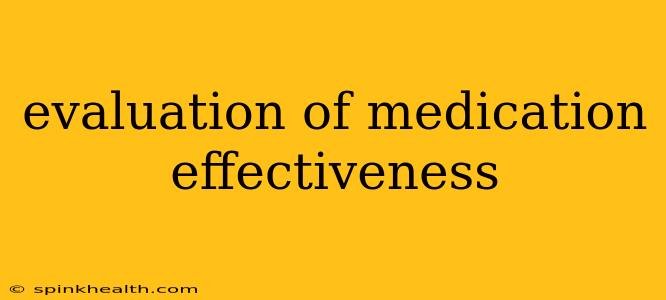The effectiveness of medication is a complex journey, not a simple destination. It's a story woven with threads of individual responses, scientific rigor, and a careful balance between benefits and risks. This isn't just about whether a pill makes you feel better; it's about understanding how well it works, for whom, and at what cost. Let's delve into the fascinating world of medication evaluation.
How is Medication Effectiveness Measured?
This is the heart of the matter. How do we know if a drug is truly effective? It's not as simple as asking, "Do you feel better?" Rigorous clinical trials, the gold standard of medical research, provide the answer. These trials involve large groups of people, meticulously designed to compare the new medication to a placebo (a sugar pill) or an existing treatment. Researchers meticulously track various outcomes, looking for statistically significant differences between groups. These outcomes might include:
- Symptom reduction: Does the medication alleviate the symptoms of the condition it's intended to treat? This is often measured using standardized scales or questionnaires.
- Disease progression: Does the medication slow down or halt the progression of the disease? This is particularly crucial for chronic conditions like cancer or HIV.
- Disease remission: Does the medication lead to a complete or partial disappearance of the disease?
- Survival rates: In life-threatening conditions, does the medication improve survival rates?
What are the Different Types of Clinical Trials?
Clinical trials are conducted in phases, each building upon the previous one:
- Phase I: A small group of healthy volunteers assess safety and dosage.
- Phase II: A larger group of patients with the target condition evaluate the medication's effectiveness and side effects.
- Phase III: A large-scale trial compares the medication to a standard treatment or placebo, confirming its effectiveness and safety profile.
- Phase IV: Post-market surveillance tracks long-term effects and rare side effects.
What Factors Influence Medication Effectiveness?
Many factors influence how well a medication works for an individual:
- Individual genetics: Our unique genetic makeup can affect how our bodies metabolize and respond to medications.
- Other health conditions: Existing health problems can interact with the medication, affecting its effectiveness or causing adverse reactions.
- Lifestyle factors: Diet, exercise, and other lifestyle choices can influence medication response.
- Dosage and administration: Taking the medication as prescribed is crucial for effectiveness.
- Patient adherence: Consistently taking the medication as directed is vital; inconsistent use reduces efficacy.
What are the Potential Side Effects of Medications?
No medication is without potential side effects. These can range from mild (e.g., nausea, headache) to severe (e.g., allergic reactions, organ damage). Careful monitoring and open communication with a healthcare provider are essential to manage potential side effects and ensure the medication's benefits outweigh its risks.
How Do Doctors Evaluate the Effectiveness of Medication for Individual Patients?
While clinical trials provide general information, a doctor considers individual factors when evaluating a medication's effectiveness for a specific patient. They'll monitor:
- Symptom improvement: Tracking changes in symptoms is a key indicator.
- Laboratory tests: Blood tests or other lab results can show how the medication is affecting the body.
- Patient feedback: Open communication with the patient is crucial to understand their experience and adjust treatment as needed.
How Can I Track My Own Medication Effectiveness?
Keeping a detailed record of your symptoms, medication use, and any side effects can be invaluable. This information can help you and your doctor assess the medication's effectiveness and make informed decisions about your treatment plan. Consider a journal or a medication tracking app.
The evaluation of medication effectiveness is a continuous process, a conversation between science, individual experience, and medical expertise. By understanding the complexities involved, we can navigate the journey toward better health and well-being.

